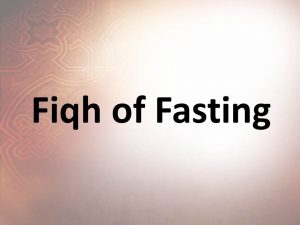The Essential Elements of Fasting
These are the mandatory acts that must be observed so that fasting can be valid.
1. The niyyah (intention)
Fasting in which the intention is not observed is invalid. Allah says,
“though they were not commanded, but to worship (One) God – making the practice of their religion pure and, sincere to Him alone, being ever upright of heart. (Qur’an 98:5)
It has been narrated on the authority of Umar b. al-Khattab that the Messenger of Allah (ﷺ) said:

The Essential Elements of Fasting are the mandatory acts that must be observed so that fasting can be valid. Read more about them here..
(The value of) an action depends on the intention behind it. A man will be rewarded only for what he intended. The emigration of one who emigrates for the sake of Allah and His Messenger (ﷺ) is for the sake of Allah and His Messenger (ﷺ) ; and the emigration of one who emigrates for gaining a worldly advantage or for marrying a woman is for what he has emigrated. [Al-Bukhārī and Muslim]
When must a person state or confirm the intention of Fasting?
Scholars differentiate between compulsory and voluntary fasting.
The compulsory fasting
The majority of scholars are of the opinion that the person must state the intention of fasting any time during the night until the time of dawn. Thus, if a person states their intention or makes up their mind to fast after the time of dawn, fasting is invalid.
To support their opinion, they used the above mentioned hadith along with the following one:
“Whoever does not form his intention to fast before to fajr (dawn), his fasting will not be accepted.” Related by the five Imams, but At-Tirmidhi and An-Nasa’i consider it to be related by Hafsah and not connected to the Prophet (ﷺ).
In Imām Abū Ḥanīfah’s opinion, it is allowed for a person to intend to fast after dawn and during the day in both voluntary and compulsory fasting as long as they have not had any food or drink.
The voluntary fasting
In voluntary fasting, the majority of scholars say that it is allowed to intend to fast during the day. For example, if a person wakes up in the morning of a certain day, they may intend to fast that day. However, this is only allowed if the person has not eaten, drunk or had sexual intercourse from the time of dawn.
There are a number of hadiths that support this opinion. Here is one of them:
‘A’isha, the Mother of the Believers (Allah be pleased with her), reported:
The Apostle of Allah (ﷺ) came to me one day and said: Is there anything with you (to eat)? I said: No. Thereupon he said: I shall then be fasting. Then he came to us another day and we said: Messenger of Allah, hais (a compound of dates and clarified butter) has been offered to us as a gift. Thereupon he said: Show that to me; I had been fasting since morning. He then ate it. (Saḥīḥ Muslim)
It should also be noted that intending to break one’s fast invalidates it.
2. Abstaining from food and drink
It is agreed upon that eating or drinking intentionally breaks one’s fast. There are proofs from the Qur’an, the Sunnah and the Consensus that indicate that the person observing fasting is not allowed to eat or drink from dawn to sunset. Allah says,
“Moreover, you may “now” eat and drink until the white thread of dawn becomes clear to you, as distinguished, from the black thread “of night”. Then complete the fast until the night” (Qur’an 2:187)
Abu Hurairah (May Allah be pleased with him) reported: The Prophet (ﷺ) said, “If one does not eschew lies and false conduct, Allah has no need that he should abstain from his food and his drink.” [Al-Bukhari]
The Messenger of Allah (ﷺ) said, “Allah says: ‘(The person observing fasting) has abstained from food and drink, and sexual pleasures for My sake; fasting is for Me, and I will bestow its reward. Every good deed has ten times its reward’.” [Al-Bukhari]
The consensus among the Muslim scholars is that intentional eating and drinking during the time of fasting invalidates it.
3. Abstaining from sexual intercourse
The person observing fasting must also abstain from having sexual intercourse during their fast. There are proofs supporting this ruling from the Qur’an, the Sunnah and the Consensus. Allah says,
“Permitted for you (believers), on the night of the fast is intimate approach to your wives. They are a garment for you. And you are a garment for them. God knows that (before granting this permission), you used to betray yourselves. Thus He has granted you repentance (for what is past), and pardoned you. So now you may lie with them and seek whatever (offspring) God has decreed for you…” (Qur’an 2:187)
Narrated Abu Huraira: A person had sexual relation with his wife in the month of Ramadan (while he was fasting), and he came to Allah’s Messenger (ﷺ) seeking his verdict concerning that action. The Prophet (ﷺ) said (to him), “Can you afford to manumit a slave?” The man said, “No.” The Prophet (ﷺ) said, “Can you fast for two successive months?” He said, “No.” The Prophet (ﷺ) said, “Then feed sixty poor persons.” [Al-Bukhārī and Muslim]
As for the Consensus, Imam al-Nawawi (may Allah shower him with His mercy) said, “The Muslim nation have reached a consensus that having a sexual intercourse is prohibited for the person observing fasting and on the invalidity of their fast.
4. Abstaining from intentional vomiting
Islam Question & Answer website discusses this issue as follows:
Vomiting refers to when food etc. is expelled from the stomach outside the body. With regard to whether this breaks the fast or not, the ruling depends on whether it was done deliberately or not. If a person vomits deliberately, this breaks the fast and he has to make up that day. If he cannot help vomiting and vomits involuntarily, then his fast is still valid and he does not have to do anything else.
If a person needs to vomit because he is sick and vomiting will help him to recover, then it is permissible for him to do that, but he has to make up that day after Ramadan, because Allah says (interpretation of the meaning):
“and whoever is ill or on a journey, the same number [of days which one did not observe Sawm (fasts) must be made up] from other days” [Qur’an 2:185]
According to the correct scholarly view, it makes no difference whether the amount of vomit is great or small. If a person vomits deliberately and only a small amount comes out, the fast is broken. It says in al-Furoo’: If a person makes himself vomit and vomits anything, then his fast is broken, because of the report of Abu Hurayrah: “Whoever cannot help vomiting does not have to do anything but whoever makes himself vomit deliberately has to make up that day.” Al-Furoo’, 3/49. This hadeeth was narrated by Abu Dawood, 2380; al-Tirmidhi, 720 – he said the scholars follow this. It was classed as saheeh by al-Albaani.
But there is a difference between spitting and vomiting. Spitting and hawking etc do not come from the stomach, so there is nothing wrong with expelling that matter. But vomiting comes from the stomach as explained above.
And Allah knows best.
[ica_orginalurl]


